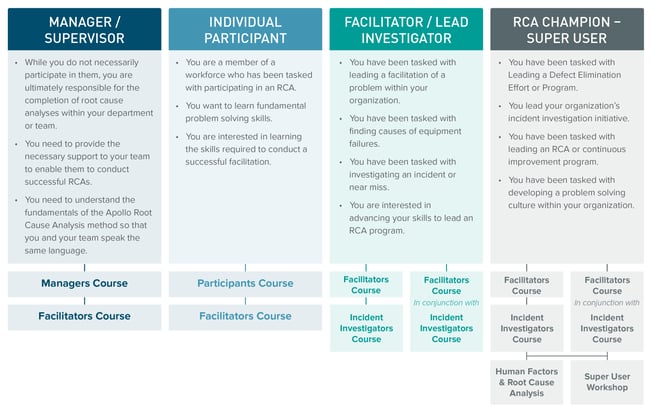 The previous article in our blog series on RCA Program Development described the responsibilities of the six roles required for your program to function well. The next step in achieving a successful RCA program is to develop a comprehensive RCA training strategy that will ensure sustainability of the effort to reduce the frequency and severity of undesirable incidents into the future.
The previous article in our blog series on RCA Program Development described the responsibilities of the six roles required for your program to function well. The next step in achieving a successful RCA program is to develop a comprehensive RCA training strategy that will ensure sustainability of the effort to reduce the frequency and severity of undesirable incidents into the future.
A common mistake is to under-train, primarily RCA facilitators, in relation to the trigger diagram which we discussed in an earlier blog post. You may recall that in developing the trigger diagram, a 3-year baseline of triggering events is reviewed to ensure an adequate balance of events and trained facilitators. Assuming the RCA facilitation responsibilities will be an addition to the existing position responsibilities, one would expect a facilitator would be leading a triggered RCA on average once per month with a series of less important ad hoc RCAs in between to stay current on skills.
There should be at least one Super User at each facility and at the corporate level. Likewise, all personnel that may be either a first responder to a triggered event or expected to participate in the RCA should be trained to an appropriate level as outlined in the table below (click photo to enlarge).
A “Refresher” course should also be undertaken as needed. An often overlooked element of a training program is the need to maintain optimum skill levels over time, especially if there are prolonged periods where the skill may not be practiced. This can often be the case with triggered events because of their random nature. This creates a danger that skills and knowledge may not improve at the same rate as other jobs skills. This is especially true for Facilitators, First Responders, and Participants. Records should be maintained that track the number of facilitated RCA, first responses, and RCA participations and reviewed at least annually. If Facilitators have gone six months, or Participants/First Responders one year, without using these skills then consideration should be given to the refresher training.
Training is an essential component for all personnel involved with an organizations’ RCA program. Having the right roles with the right skills and ensuring those skills stay fresh over time is important to the overall success of your RCA effort. ARMS Reliability leads world-class training to assist you in every stage of your RCA journey. Learn more about the required and recommended courses, and contact us for more information.
So far, this blog series has covered:
The Key Steps of Designing Your Program
Defining Goals and Current Status
Setting KPIs and Establishing Trigger Thresholds
RCA and Solution Tracking and Roles and Responsibilities
Recommended RCA Team Structure
Responsibilities of the Six Roles
And, RCA Program Development Training Strategy.
Stay tuned for our next installment on RCA Effort Oversight and Management.


